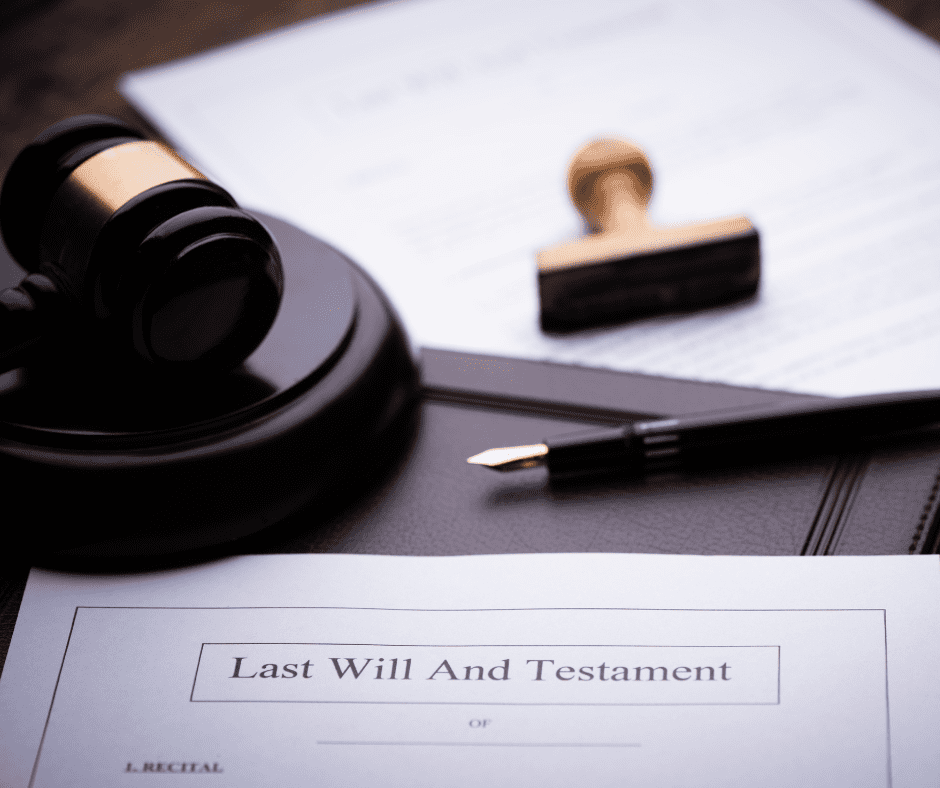
A will, or a last will and testament, is a legal document which designates how to manage your affairs and distribute your assets after death. This includes the distribution of property, guardianship of children (if any), funeral arrangements and more. Wills make it easier to divide up your belongings and fulfill your final wishes. A properly written will makes the distribution of your assets an easier process for your loved ones and beneficiaries.
- Do You Need A Lawyer To Write A Will?
- How Important Is A Will?
- Dying Without A Will
- What About Your Children?
- Hummingbird Can Help
- Commonly Asked Questions About Wills
Do You Need A Lawyer To Write A Will?
Making a will is a crucial declaration that ensures your possessions and assets are distributed according to your wishes after your life.
Although it may seem like a simple process, it’s best done with the aid of an estates lawyer. A lawyer well-versed in wills can offer you professional and essential legal advice on the documentation, effects, and legal procedure that must be followed.
Your specific situation, such as being common law, owning a business, or having a blended family, can have legal consequences to your will. Ultimately, having a wills lawyer on your side can offer peace of mind for both you and your loved ones in Ontario.
How Important Is A Will?
Your family and loved ones are the most important part of your life. Wills are crucial in order to protect your loved ones and to ensure that your estate is properly divided amongst them, as you wish.
The outcome of an estate can be left up to so many variables, that you don’t want to take any chances with your life’s work and your legacy.
Ultimately, a will is one of the most important documents you can have in order to avoid the list of potential issues that can arise in the absence of having a will.
For example, without a will, your death will be intestate.
In Ontario, if you die without a will, your estate will be subject to statutory provisions which dictate the division of your estate, completely negating your wishes. This is why it is important to properly document your wishes in the form of a last will and testament.
If you are a business owner, a corporate will can allow you to keep your business assets separate from your personal ones and will not force it to go through probate, therefore avoiding a probate fee.
Dying Without A Will
If you simply want to leave everything to your married partner, and you have no children, then without a will your legally married partner has the right to your estate.
If, however, you and your partner are unmarried or in a common law relationship, your partner does not have the same right to your estate since in Ontario, common law spouses are not considered to be “next of kin” under the province’s Succession Law Reform Act, RSO 1990, c. S.26. This means that common law spouses are not entitled to their partner’s assets without the express wishes of the deceased in a will.
Under the act, if you’re not married, your estate will:
- Go to your children
- If you have no children, then your next of kin would be your surviving parents
- If none, then your siblings
- Or, if they are no longer alive, then it will be divided among nieces and nephews
What about your children?
While the children will still receive significant portions of your estate without a will, it will not necessarily be divided in accordance with what you wanted if you didn’t express your wishes in the form of a will.
Due to the possible sentimental attachment to property or heirlooms, the uncertainty that the absence of a will creates can lead to arguments or differences between your children regarding certain assets in your estate.
In the event that your children are unable to resolve these disputes, the articles of the estate are forced into sale and division of the estate will just become one of finances. It is advisable that you speak to a wills and estates lawyer to understand the consequences of not having a will.
A wills and estates lawyer can assist you in drafting a will that clearly states your wishes to ensure that you’re not burdening your children with unnecessary stress and potential family disputes.
Hummingbird Can Help
Having a will is crucial to ensure that your loved ones are protected, your possessions are distributed in the manner in which you want. If you’re a business owner, you want to protect the shares and assets of your business and ensure that they’re transitioned properly.
While Ontario may have some statutes and provisions set in place to divide your estate after your death, it surely won’t be divided the way you would have wanted. The wills and estates team at Hummingbird Lawyers LLP is well versed, experienced and skilled in assisting you with your will. Writing your will doesn’t have to be an overwhelming experience. Trust Hummingbird with your most precious legacy; your family’s financial security after you’re gone.
Frequently Asked Questions about Wills
Do I really need a Last Will and Testament?
YES! Here are my top 5 reasons why you need a Last Will and Testament
- Common law spouses are not entitled to the same property rights as legally married spouses. Without provisions in your will, your common law spouse will not inherit property under the law in Ontario. Your estate would go to your closest living relative and completely bypass your common law spouse.
- If you have children, your legally married spouse will not inherit everything. Your spouse will only inherit the first $350,000 of your estate and then would equally share the remainder with your children.
- If a minor child inherits more than $35,000, the surviving parent will have to apply to the Office Public Guardian Trustee and ask permission to become the Guardian over the money. A parent is not an automatic Guardian of your child’s money.
- A proposed Estate Trustee or Guardian may be required to post a bond with their application. Posting bond could be as high as three times the worth of the estate.
- You can reduce Estate Administration Tax exposure. By reviewing your assets with a lawyer, we can identify issues you may not think about on your own. There are planning tools such as dual wills, beneficiary designation forms, family trusts, capital gain planning, and joint tenancy just to name a few.
What happens if I die without a Last Will and Testament?
The Ontario Succession Law Reform Act will determine who the beneficiary of your estate will be.
If you are legally married with children, your spouse will not receive your entire estate!
If your children are minors, the Office of Public Guardian will become involved in the process.
A surviving parent is not the guardian of your child’s money.
What is a “Corporate Will” or a “Second Will”?
Typically, one person would have one Last Will and Testament that handles all aspects of their estate. The Ontario Supreme Court however, changed this idea with the ruling in Granovsky Estate v. Ontario.
In this case, the court accepted the concept that a person could have two Wills;
one Will that pays the administration tax and goes through probate and a second Will that does not go through probate and avoids the administration tax.
This created the Primary and Secondary Will concept.
Imagine two buckets:
One bucket holds all your personal items such as your bank accounts, real estate and personal belongings, and the second bucket only holds your corporation ownership.
By separating these assets, only the assets in your primary Will would go through probate and be subject to the administration tax (probate fee).
The secondary will that only holds your business ownership will not go through probate and will avoid the administration tax.
Does divorce revoke my beneficiary designations for life insurance or RRSPs?
NO!! These designations will be honoured regardless of the status of your relationship.
This includes second marriages.
You must take proactive steps to change these beneficiary designations.
How much does a Will cost?
Please fill out the short form to get a quote to make a Will and our Wills & Estates lawyer will reach back to you.
Alternatively, you can call Hummingbird Lawyers directly at 905.731.1911 or email info@hummingbirdlaw.com.
With esteemed, skilled and capable lawyers in Toronto and lawyers in Vaughan, Hummingbird Lawyers LLP has locations in both areas to serve our clientele. Choose the location more convenient to you, and let us assist you with your legal matters.
If you have questions about Wills, please contact:
Tracey Jones, Law Clerk
Email: info@hummingbirdlaw.com
Phone: 905 731 1911
Related Article
For all other inquiries, please fill out this form and our Wills & Estates lawyers will get back to you




Urgent. My 3 years deadline is coming up this month our birth father Frank passed away he has three children. The currant wife is Not our mother. At the funeral his wife handed out document that frank bodr has not a will as thou she is hiding something turns out after posting artical in news paper looking for last wil that he did in deed have a will 35 yrs ago. From witness. Plus the daughter of lawyer who prepared will passed away but she called me to say who she turned wills over too. Can you help us.
margaret Bodri. And kathy. The estate exceeds well over the 200,000
Thanks for your message, Kathy.
Please get in touch with our Wills & Estates lawyers by calling our firm directly at 905-731-1911.
Hello,
I am widowed and have an adult child. I have no property or real estate. I rent an apartment. My daughter is the beneficiary of my ife insurance, RRSPs, investments, TFSA account. My chequing and savings account is not co signed by my daughter. What type of will do I need?what would be the cost? Please advise
Thank you and keep safe
Karen
Thanks for your message, Karen.
Our Wills & Estates lawyers, Amy MacAlpine, sent you an email with the details. If you would like to get in touch with us you can reply to her email or simply contact us directly at 905.731.1911.
My father signed me and my brother (we are adults) as beneficiaries on his life insurance policy 12 years ago. He passed away, and his new wife is saying the life insurance should be hers. My father was very ill, and signed a will (no lawyer present) a few weeks before he died, leaving everything to his new wife. The will makes no mention of the life insurance policy. Does this will revoke my brother and I as beneficiaries to his life insurance policy if there was no mention of it in this will?
Hello and thank you for your comment.
If there is no life insurance designation clause in the Will, then the old designations are valid.
It does not fall to the estate. You should be able to submit a claim to the insurance company directly.
Amy